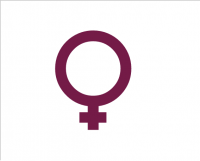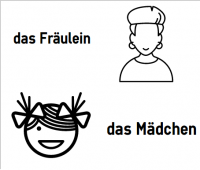Gender of German nouns (substantives) - der, die, das
Sign up for free to get all information about private lessons and our available group courses (A1, A2, B2, B2, C1, C2)
Sign up for freeSign up for free to get all information about private lessons and our available group courses (A1, A2, B2, B2, C1, C2)
Sign up for freeThis topic is about the three different genders in the German language. These are the different genders.
In the following you will find various rules that can give you hints about the gender of a noun.
Masculine nouns in German use the definite article der or the indefinite article ein before the noun.
 There are several criteria that indicate if a noun is masculine.
There are several criteria that indicate if a noun is masculine.
For example:
Male persons: der Mann (man), der Onkel (uncle), der Opa (grandpa)
Professions: der Lehrer (teacher), der Koch (cook)
Days and months: der Montag (monday), der Dienstag (tuesday), der September (september), der Oktober (october)
Seasons: der Winter (winter), der Sommer (summer), der Herbst (autumn), der Frühling (spring)
cardinal points: der Norden (north), der Süden (south), der Osten (east), der Westen (west)
some weather conditions: der Tau (dew), der Schnee (snow), der Regen (rain)
currency: der Dollar, der Euro
Take online language lessons with a professional teacher
| Ending of the noun | Example |
|---|---|
| -ant | der Diamant (diamant), der Elefant (elefant), der Mandant (mandator) |
| -är | der Bär (bear), der Sekretär (secretary) |
| -eur | der Amateur (amateur), der Friseur (hair dresser) |
| -ich | der Rettich (radish), der Teich (pond), der Bindestrich (hypen) |
| -ig | der König (king), der Honig (honey), der Teig (dough) |
| -iker | der Musiker (musician), der Techniker (technician) |
| -ist | der Spezialist (specialist), der Artist (artist) |
| -ling | der Feigling (coward), der Liebling (darling), der Schmetterling (butterfly) |
| -or | der Marmor (marble), der Senior (senior) |
You can find more information about masculine nouns in following chapters.
Feminine nouns in German use the definite article die and the indefinite article eine before the nouns.
There are several criteria that indicate if a noun is feminine.
Here are some examples:
 Numbers used as nouns: die Eins (one), die Zwei (two), die Drei (tree)
Numbers used as nouns: die Eins (one), die Zwei (two), die Drei (tree)| Ending of the noun | Example |
|---|---|
| -ei | die Fischerei (fishery), die Malerei (painting), die Bäckerei (bakery) |
| -in | die Asiatin (asian), die Lehrerin (female teacher) |
| -keit | die Helligkeit (brightness), die Ähnlichkeit (resemblance), die Haltbarkeit (durability) |
| -ung | die Änderung (change), die Begabung (aptitude), die Lösung (solution) |
| -ion | die Station (station), die Funktion (function), die Auktion (auction) |
| -ine | die Blondine (blonde), die Gardine (curtain), die Mine (mine) |
| -schaft | die Gesellschaft (society), die Botschaft (message), die Wirtschaft (economy) |
| -ade | die Marinade (marinade), die Olympiade (olympics), die Fassade (facade) |
| -ette | die Kette (chain), die Manschette (wristband), die Limette (lime) |
| -ik | die Kritik (critisicm), die Politik (politics), die Elektrik (electrics) |
| -ur | die Struktur (structure), die Archtiketur (architecture), die Prozedur (procedure) |
| -sis | die Skepsis (scepticism), die Basis (base) |
| -tät | die Identität (identity), die Aktivität (activity), die Realität (reality) |
| -heit | die Freiheit (freedom), die Gewohnheit (habit), die Dummheit (foolishness) |
| -ie | die Anatomie (anatomy), die Fantasie (fantasy), die Chemie (chemistry) |
You can find more information about feminine nouns in following chapters.

Neuter nouns in German use the definite article das and the indefinite article ein before the nouns.
There are several criteria that indicate if a noun is neuter.
| Ending of the noun | Example |
|---|---|
| -chen | das Anzeichen (indication), das Mädchen (girl) |
| -lein | das Krönlein (little crown), das Männlein (little man) |
| -tum | das Datum (date), das Christentum (Christianity), das Wachstum (growth) |
| -o | das Auto (car), das Radio (radio) |
| -ett | das Brett (board), das Bett (bed) |
| -ment | das Apartment (apartment), das Element (element), das Kompliment (compliment) |
| -ma | das Klima (climate), das Thema (topic), das Drama (drama) |
| -um | das Aquarium (aquarium), das Basilikum (basil), das Zentrum (centre) |
You can find more information about neuter nouns in following chapters.
![]() Keep in mind: there are a lot of exceptions in the German language. You can find some of them in the following chapters.
Keep in mind: there are a lot of exceptions in the German language. You can find some of them in the following chapters.
Compound nouns are nouns that are composed out of two or more words and then build a new word with sometimes a new meaning.
The last word always determines the gender, the number and the case of the compound noun. It is also the only one to decline depending on the case.
Compound nouns can be formed out of
You can find a detailed explanation in future chapters. In addition, do the exercises to anchor your knowledge.
![]() It is way more easier to learn the plural form by heart. Test your skills with challenging exercises of the three German genders.
It is way more easier to learn the plural form by heart. Test your skills with challenging exercises of the three German genders.
| 1 German masculine nouns list | Learn the German masculine nouns here with a fun and interactive lesson! |
| 2 German feminine nouns list | Learn the German feminine nouns with a fun and very interactive lesson. |
| 3 German neuter nouns list | Learn the different German neuter nouns with a fun and interactive lesson! |